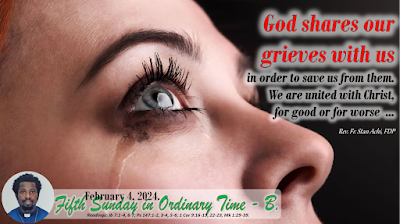GOD IN THE DRAMAS OF HUMANITY.
February 4, 2024.
Fifth Sunday in Ordinary Time – B.
“Simon's mother-in-law lay sick with a fever. They
immediately told him about her. He approached, grasped her hand, and helped her
up…” Mk 1:30
A Haitian proverb says: “True courage is knowing how to
suffer.” An Akan proverb adds: “To suffer doesn't mean to die.”
Life is not without dramatic situations and happenings. From
times, when we look at all the events that surround human life and the dramatic
experiences some people go through, we are tempted to ask, why? Why does God
allow such suffering? Where is he when mankind suffers?
Human suffering is a perpetual question of faith and to God.
Professor Douglas John Hall wrote a beautiful essay with an amazing title,
"God & Human Suffering, an exercise in the theology of the
Cross." The title itself puts a question and leads to an answer. When we
suffer, God is never away from us. Suffering becomes an exercise and a way to
understand the Cross as a means of salvation. The Lord Jesus is always with us
in the journeys of our lives, and most especially, he suffers with the
suffering humanity. God shares our grieves with us in order to save us from
them. We are united with Christ, for good or for worse.
The Catechism expresses well that union with the Lord when
it speaks of the mystery of the Church: "It is in the Church that Christ
fulfills and reveals his own mystery as the purpose of God's plan: "to
unite all things in him." St. Paul calls the nuptial union of Christ and
the Church "a great mystery." Because she is united to Christ as to
her bridegroom, she becomes a mystery in her turn. Contemplating this mystery
in her, Paul exclaims: "Christ in you, the hope of glory." CCC 772
God is with us, even when we suffer. The experience and
story of Job must always be alive in us. It describes in dramatic terms the
situation of humanity on earth. This legend concerns Job, a prosperous man of
outstanding piety. Satan acts as an agent provocateur to test whether or not
Job's piety is rooted merely in his prosperity. But faced with the appalling
loss of his possessions, his children, and finally his own health, Job still
refuses to curse God. Even when everything went wrong and there seemed to be no
more hope for life, Job had a beautiful expression of firmness in the Lord.
"I know that I have a living Defender and that he will rise up last, on
the dust of the earth. After my awakening, he will set me close to him, and
from my flesh I shall look on God..." Job 19:25-26.
Yes, like Job, we must keep this assurance that we have a
living Defender. Our God does not sleep. He is always by our side, even when we
suffer. Thus, the invitation of the Psalmist: "Praise the Lord, who heals
the brokenhearted."
In the Gospel, the Lord Jesus expresses this proximity of
God to the suffering humanity. Mark
mentions that he "cured many who were sick with various diseases." He
is not limited only to teaching the Word of God in the Synagogues, but also
touches human sufferings and heals them.
Through the Lord Jesus, we also learn that God's compassion
is limitless and open to everyone and every place without discrimination and
distinction. While everyone in Capernaum was looking for him, Jesus' answer to
his disciples was: “Let us go on to the nearby villages that I may preach there
also. For this purpose have I come.” To tell us that no one is excluded from
God's mercy and compassion and that the Lord is close to anyone who suffers.
Like Jesus, we are urged to be instruments of God's compassion and love, to comfort our brothers and sisters in difficult times and sorrows. We can, however, not do this without intimacy with God. And this, we also learn from Jesus. After a night of miracles and healings, he went before dawn to a deserted place to pray. Prayer is the key to miracles. Without prayer, we can do nothing great. And, through prayer, we discover our vocation, which is to preach the Gospel through our words and actions. Like Paul, may we say: "Woe to me if I do not preach the Gospel."





Comments
Post a Comment